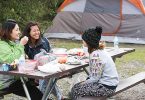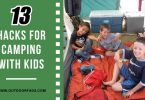We may receive commissions when you buy through the links on our site. Full Disclaimer.
Like almost any other outdoor activity, camping is subject to the natural elements. Rain, snowfall, and other weather conditions can affect your camping trip drastically.
If you don’t take the right precautions or steps, the snow and cold winter conditions could destroy what promised to be an eventful cause.
But with the right hacks, you’ll have a blast camping in the winter. There are no bugs at the campsite during this period. Also, the campsites are uncrowded and less busy. Furthermore, you can follow animal tracks better. These and other advantages make winter camping a must-try.
I’ll be showing you my favorite hacks for winter camping. Here they are:
1. Insulate Your Tent
Insulate your tent with sheets, blankets, and other materials to keep you warm at night. Get thermal blankets and line them up inside your tent using duct tape. The blankets will reflect your body heat and the residual heat in the tent at you.
2. Ensure That Your Tent is Well Heated
A well-heated tent will keep you warm and comfortable regardless of how cold it gets when camping in the winter. You could go along with portable electric heaters. When buying a tent, you should consider the one dedicated to winter camping, see Best Winter Tent with Stove Jack.
You can also wrap hot stones and coal from your campfire and pack them at the center of your tent or under your sleeping bag to keep you warm. You can also pour hot water into bottles and sleep with the bottles in your sleeping bag.
3. Ensure The Snow At Your Campsite is Well Packed
When you get to the campsite, you can wear snowshoes and skis and use them to tramp around hard on the ground until the snow is packed. This way, you won’t step on soft snow on the floor of your tent, which can puncture a hole in the flooring and tear it down.
Packing the snow will also prevent slips and falls. Regular shoes can also work for this if you didn’t bring along skis and snowshoes with you. But they will take a longer time to get the snow around the campsite packed.
4. Inspect Your Tent and Other Items for Damage
Inspect your tent and other items for leaks or damage to ensure that no melted snow water can come in. Do this before leaving home. You don’t want to get to the campsite only to find out that an item leaks. Fix all the damages that could cause leaks. Read: Best Tent Waterproofing Methods and Best Tent Waterproofing Spray
5. Protect Yourself from the Cold Ground
Go with extra groundsheets and insulation for the ground. Strong foam carpets also work. Take along a good, well-insulated sleeping pad. If your sleeping pad isn’t good enough, you can stuff extra clothes under you to keep yourself warmer.
6. Go Along with Good Winter Protective Clothing
You’ll need a good pair of winter/snow boots for hiking or performing outdoor activities. Bring your boots in at night, so they do not freeze at night. It would help if you also had a thick protective pair of gloves and mittens to protect your hands from the cold.
Try to wear 3-layer protective clothing for cold, wind, and wicking. Go with scarves, socks, and balaclavas too. Change into dry clothing before you sleep at night.
7. Go Along with Extra Clothing
The weather conditions could get tougher than you think and you might need more clothes than you would normally. Take an extra change of clothes with you to the campsite.
Don’t forget to go along with extras for smaller clothing items like socks, gloves, and hats.
8. You Might Need a Peeing Bottle When Camping in the Winter
During the cold winter months, we often urinate more often than usual. It could be difficult to get up in the thick of the night, unzip your warm clothing and tent, and then make your way out in the blistering cold.
A peeing bottle can save you from all that stress. Ensure that the peeing bottles are well-marked with duct tape or something else, so you do not mistake them for water bottles.
9. Don’t Drink Melted Cold Water Without Boiling It
A lot of campers get water from melted snow. But many of them think that they can drink this water or use it for cooking without sterilizing it. Snow water isn’t as clean as you might think it is. Sometimes, snowflakes form around dust and dirt.
Boil the water before drinking it or using it for cooking.
10. Be Careful with Inflammable Heating Sources
During the cold winter season, some people will depend on naked lighting sources like candles to keep themselves warm at night. Some may even move their campfire closer to the tent than it should be. Be careful about doing this, so you do not start a fire.
When your campfire is close to the tent, the wind could blow fire embers towards the direction of your tent.
11. Apply Vaseline Liberally on your Body to Protect Yourself from Frostbite
Apply Vaseline to every exposed part of your body. This includes your hands, neck, face, and wrists. The Vaseline will protect you from frostbite and windburn.
12. Hold a Pair of Goggles or Sunglasses to Avoid Snow Blindness
Snow blindness occurs when the sun reflects off the snow and prevents you from seeing properly. Take along a good pair of goggles or sunglasses with you to avoid any temporary loss of vision.
13. Flip Your Sleeping Bag Inside Out to Dry It
If it isn’t snowing in the afternoons, you can turn your sleeping bag inside out to dry it. This will make it dry out faster. If you have a large water container, you can flip the water container upside down so the cold weather doesn’t freeze the container’s cover.
14. Go With Lithium Batteries Instead of Alkaline Batteries
Alkaline batteries do not work well in the cold winter weather. Go along with lithium batteries instead.
Conclusion
If you plan to organize a camping trip during the winter and worry about it, you don’t need to any longer. The tips in this article will keep you safe and warm all through your camping trip.




